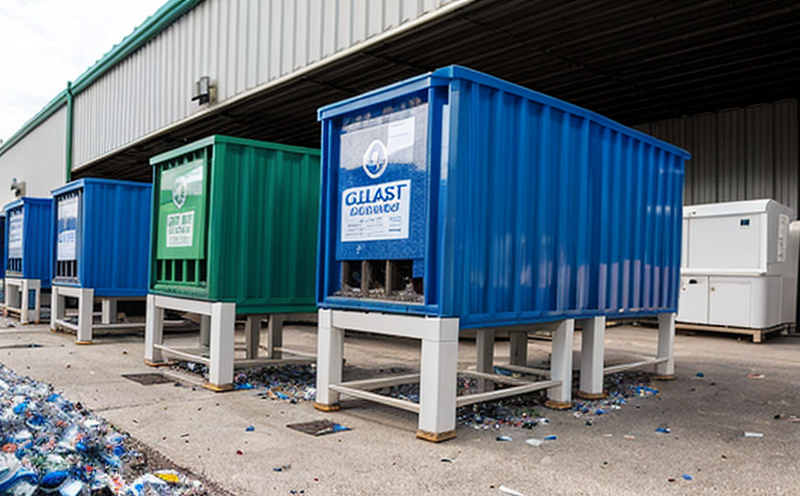EN 12912 Arsenic in Recycled Ceramics
The European standard EN 12912 specifies the determination of arsenic in recycled ceramics. This test is crucial for ensuring that reused ceramic materials do not contain unacceptable levels of harmful elements, particularly arsenic, which can pose significant risks to human health and the environment.
Recycling ceramic materials offers numerous benefits, including reducing waste sent to landfills and conserving raw materials. However, it also introduces potential contamination risks from the original sources of the ceramics. Arsenic is a prime example of such contaminants; it can leach into soil or water if not properly managed.
The test procedure outlined in EN 12912 involves several steps to ensure accurate and reliable results:
- Sample Preparation: The ceramic samples are first crushed to a uniform particle size. This step is critical as it ensures that all particles have equal exposure during the digestion process.
- Digestion: The prepared samples are digested using a mixture of concentrated acids, typically nitric acid and hydrogen peroxide, under controlled conditions. Digestion ensures the complete breakdown of organic matter and allows for the release of arsenic into solution.
- Measurement: Once digested, the solutions are analyzed using inductively coupled plasma optical emission spectrometry (ICP-OES) or similar techniques that provide high precision and accuracy. The method is capable of detecting very low concentrations of arsenic.
The standard specifies clear acceptance criteria: the limit for arsenic content should not exceed 2 ppm (parts per million). Compliance with this limit ensures that recycled ceramics are safe for reuse in various applications, such as road construction or garden furniture.
Compliance with EN 12912 is particularly important for industries involved in waste management and recycling. Quality managers need to ensure that the processes they implement meet regulatory standards, while R&D engineers can use these tests to innovate safer and more sustainable materials. Compliance officers must also stay updated on such regulations to avoid legal issues.
For procurement teams, selecting suppliers who follow this standard ensures a high level of quality in recycled ceramic products. By integrating this test into their supply chain management, businesses can contribute to broader environmental sustainability goals without compromising product safety or performance.
Quality and Reliability Assurance
The reliability of the results obtained from EN 12912 is paramount. To ensure consistent quality, several key factors must be considered during sample preparation, digestion, and measurement:
- Standard Operating Procedures (SOPs): Strict adherence to SOPs ensures that all steps are carried out uniformly across different batches of samples.
- Digestion Conditions: The temperature, time, and concentration of the acids must be carefully controlled. Any deviation can lead to incomplete digestion, affecting the accuracy of the results.
- Instrument Calibration: Regular calibration of instruments is essential to maintain their precision and reliability. This ensures that measurements are accurate and reproducible.
- Analytical Reagents: High-quality reagents should be used throughout the process. Impurities in these can introduce errors into the final results.
Quality assurance also involves regular internal audits to check for any procedural deviations or equipment malfunctions that could affect the test outcomes. External calibration and proficiency testing further enhance reliability by validating the lab’s capabilities against established standards.
The use of advanced technologies, such as ICP-OES, ensures high accuracy and precision in measuring arsenic content. These instruments are capable of detecting trace amounts of metals, making them ideal for this type of analysis. By leveraging such technology, laboratories can provide reliable data that meet the stringent requirements set by EN 12912.
Environmental and Sustainability Contributions
The implementation of EN 12912 plays a crucial role in promoting environmental sustainability. By ensuring that recycled ceramics do not contain harmful levels of arsenic, this standard helps protect ecosystems from contamination. This contributes to the broader goal of reducing waste and conserving natural resources.
Recycling ceramics reduces the demand for virgin raw materials, which are often extracted through environmentally damaging processes such as mining. This shift towards recycling also decreases greenhouse gas emissions associated with manufacturing new products. By adhering to EN 12912, businesses can play a significant role in mitigating these environmental impacts.
Furthermore, the standard supports circular economy principles by encouraging the reuse of materials that have been properly tested and deemed safe for further use. This not only reduces waste but also fosters innovation within the industry, leading to more sustainable products and processes.
The test results from EN 12912 can be used as part of a company’s environmental management system (EMS). EMS helps organizations integrate environmental considerations into their core business activities, ensuring that they continually improve their performance. By demonstrating compliance with such standards as EN 12912, companies can enhance their reputation and attract environmentally conscious consumers.
Competitive Advantage and Market Impact
Compliance with EN 12912 provides a significant competitive advantage in the market. Consumers, especially those concerned about environmental impact and product safety, are increasingly favoring businesses that demonstrate sustainable practices.
By ensuring that recycled ceramics meet or exceed the required arsenic limits, companies can differentiate themselves from competitors who may not adhere to such stringent standards. This commitment to quality and sustainability can lead to increased customer loyalty and market share.
In addition, compliance with EN 12912 can open up new markets for recycled ceramic products. For instance, some regions have strict regulations regarding the use of recycled materials in certain applications. By meeting these standards, businesses can tap into these markets and expand their global reach.
From a regulatory standpoint, adhering to this standard also reduces the risk of non-compliance fines and legal actions. This proactive approach not only protects the company’s reputation but also ensures long-term sustainability by avoiding costly disruptions in operations.
The ability to consistently provide safe and reliable recycled ceramics is key to maintaining trust with stakeholders, including employees, customers, investors, and regulatory bodies. By prioritizing compliance with EN 12912, businesses can build a strong foundation for sustainable growth and success.





